The mystery of life isn’t a problem to solve, but a reality to experience.1
*SPOILERS, OBVIOUSLY*
Denis Villeneuve’s Dune films, DUNC as they style themselves, have not been popular in some quarters. As someone who loved the novel, but not a franchise fanatic (never read the sequels), I feel I ought to give way to those more versed in Frank Herbert’s universe to make the call on to what extent the films get Herbert “right”, but I have to say that I do, broadly speaking, like them, especially the first one. This second part, however, gets some key things so wrong that even a Herbert novice like me can’t help but notice.
Video version (slightly different content):
They aren’t masterpieces of drama or intrigue and can absolutely, along with Villeneueve’s entire villenœuvre, be accused of putting style over substance but, and this is a real compliment, I did feel, at least in the first film, like I was watching Dune. Regrettably, as this sequel ramps up the “substance” and tries to introduce more conflicts, it departs from exactly what the first part got right and actively works against its thematic strengths. Conspicuous insertions made by the filmmakers work to critique or even ridicule the movie’s own strongest points: an impressive visualisation of the cosmic wonder of Herbert’s setting.
To be charitable, the alterations seem intended to weave in thematic elements of Herbert’s that would be difficult to put across with the limits inherent to movie adaptations. They run away with themselves, however, ending up garbling the maturely tragic tone of Herbert’s work and attitude to the issues addressed in the book and presenting instead a snide and clumsy critique in Dune-clothing. Contemporary politics and the shrill voice of the spirit of HR rear their groan inducing heads too often to let slide.
Hollywood can’t let things go to screen untainted.
Deep Ecology and the Philosophy of Dune
“The highest function of ecology is understanding consequences.”2
In the far future, after expanding across the galaxy, mankind was nearly wiped out during a rebellion of intelligent machines. The post-apocalyptic society that arises is a kind of interstellar feudalism. Technology is heavily restricted and control over space travel limited to a secretive guild. Dune’s science fiction elements, or its hypothetical suppositions are built on the augmentation and enhancement of human power: intellect; reasoning; psychic will and self-mastery, not technology, as in other sci-fi.
On top of this and regarding the area we’ll focus on in this article, as a keen geographer and ecologist, Herbert was acutely aware of how environment shapes people and society, especially once technology no longer exceeds the given limitation of nature (a familiar topic to my regular readers!).
Paul Atreides (Timotheé Chalamet), heir to one of the Great Houses in the Galactic Imperium, ends up going native among the Fremen, inhabitants of the desert planet Arrakis, who are the embodiment of Herbert’s ecological notions. He is quickly realised to be the fulfillment of a messianic prophecy among them and leads them to victory against their outworld foes, crowning himself emperor of the universe through the military might they lend him.
The novel’s philosophy (a terrific refresher can be found in a recent article in
) is built around these two main areas, but my focus will be on the ecological aspect that the film does no justice, disrupting the presence of the “spirit of Herbert” in the movies altogether.The natives of Arrakis are defined by the desert, to the extent that they are evolutionarily adapted to the scarcity of water.3 It moulds them in every respect; this formative pressure is the essence of the Fremen, determining not only their way of life, but the horizon of potentiality of thought available to them. They are shown to preserve water at all costs, wearing “stillsuits” to catch all expelled moisture, going so far as to extract it from the dead.
The prolific ecophilosopher Chad A. Haag, who has himself explored these themes in Dune extensively, has developed a system of philosophy that is extremely revealing when applied to the novel and demonstrates the shortcomings of DUNC 2 very effectively.
Haag’s intimidatingly named Hermeneutics of Ecological Limitation can be simply condensed into the proposition that: how we interpret phenomena is determined by the underlying “shape” of our ecological context. Every layer of meaning is characterised by the “deep meme”; the subonscious registration by man of the “soma”; the substance that defines the horizon of possibility in that given context. In the agrarian worldview, the soma was grain and the deep meme was the circle, the cyclical phases of the year that determined the availability of grain and as such defined the entire potentiality of that world, structuring all levels of thought. Haag gives the example of the cyclical nature of Dante’s Divine Comedy, belonging to the mediaeval worldview.4
The wastefulness common to the fossil-fuel worldview of our current context,5 is embodied in the villainous House Harkonnen, gluttonous exploiters of Arrakis, who mine it for spice, the MacGuffin wondersubstance required for interstellar travel and only found on Arrakis. It could be said that the Haagian “soma” of the Imperium in Dune is spice, where our own is oil, similar, although limited due to various specifics of the setting.6
On Arrakis, the soma is the availability of water. The “shape” of vapour defining all reality and meaning. From Haag’s titanic work Hermeneutical Death:
Each level of meaning, even the deepest layer of the Soma itself, already embodies the full logic of Arrakeen Vapour by emphasising scarcity, preservation, and the inevitable disappearance of precious resources - in other words, the exact opposite of the Fossil Fuel Worldview.7
The prohibition “Waste not!” is therefore the primary ethical mandate for the Arrakeen citizen, one which posits the “proper body” itself as one which wastes no water.8
Crucially for Haag, nature does not only determine physical activity necessary to survive and thus “way of life”, but thought: the horizon of what is thinkable. Only that which is underlined and supported by the soma can be conceived. As we will see further on, this is one area in which DUNC 2 falls woefully short, even outright violates.
Re. the opening quotation to this section, the Arrakeen worldview is a consequence of ecology. This is encapsulated in what Herbert, through the character of Liet Kynes, planetary ecologist of Arrakis names the
Law of the Minimum […] Growth is limited by that necessity which is present in the least amount. And, naturally, the least favourable condition controls the growth rate […] You merely have to understand the limits of the planet and pressures upon it.9
So, the Fremen are not just cool as hell out of some arbitrary choice. They are how they are because they have to be, in every respect. Any aberrant element in their society is extinguished as rapidly as it emerges. It is the very harshest instantiation of ecological limitation, which gives rise to the strength and fanatical fervour of the Fremen in the novel, the essence of their galaxy-reshaping power.
DUNCing on the Fremen
So, how well does this make its way from page to frame?
Ehh…
Yes, we are shown that water is scarce to the Fremen and the plot and visual elements are all there to portray their fascinating fictional culture, which emerges dynamically out of the limits of the setting (properly done worldbuilding!). Unfortunately, this is a film that can’t go five minutes without deconstructing itself.
Parting ways with the book, Dune: Part Two decides to introduce an element among the Fremen who are not bought in to the traditional religious values of their kind. The character that the film pretends is the book’s Chani (Zendaya), Paul’s Fremen love interest, is downright secular in her attitudes. Openly decrying the adulation around Paul and the scripture he fulfills as the manipulation of her people by foreigners (the prophecy was planted on Arrakis by the secretive order of the Bene Gesserit, completely unknown to the Fremen in the book), denouncing her own name as coming from “some stupid prophecy”. She and her ilk oppose the Fremen “fundamentalists”10 to use the films own words, who come largely from the “South” of the planet. We’ll return to this extremely subtle political commentary later on.
Yes, it’s true that after the publication of Dune Herbert was not happy with people uncritically embracing Paul as a hero rather than antihero and film Chani is meant to voice opposition to this attitude,11 cautioning blind hero-worship. It just causes more problems than it solves and is done so cack-handedly as to disrupt the entire tone of the film. Trojan-Horsed into this adaptation is a barrel of modern politics that have absolutely no bearing on Herbert’s vision or message, regardless of what we want to say about his critical attitude towards hero-worship, for now though, let’s focus on how these changes completely disrupt Herbert’s eco-philosophy.
The film wants to have things both ways, making changes to the upshots of Herbert’s worldbuilding that break the whole fabric of the Arrakeen worldview, while wanting to keep the elements of it that it finds palatable with modern tastes; adequately transposed onto currentist political trends. These changes are meant in part to make the Fremen “sympathetic”, missing the point entirely and actually showing inadvertent disrespect to the real world cultures that inspired them.
Either the Fremen are religious fanatics and rugged desert survivalists, or they are neither. You cannot swap out either element and hold on to the other, because secularism belongs to the age of the arbitrary, which is the age of the suspension of harsh ecological limitation. This is the soul of the Fremen: they are one with the desert and utterly defined by its strictures. The film has no understanding of this. It makes them out to be “the goodies” because they happen to choose to be nice to eachother, importing modern arbitrarity into a setting whose entire lifeblood and richness is in its regard for ecological necessity. The modern sentiments given to Chani would be unthinkable in the Arrakeen ecological context.
God created Arrakis to train the faithful.12
Being Fremen means having absolutely no choice in virtually anything. As we saw in the previous section, ecology does not just define the way of life of a people, but determines their entire horizon of possible thought, including religion. Dune is not wholly mythopoetic as a setting, but it understands the “religious adaptation”13 of the Fremen as a phenomenon of necessity and a consequence; not some arbitrary delusion to be ridiculed, or swapped out at will. Chani and the other Fremen that reject the religiosity of their people are, in Chad Haag’s terms an “ecologically impossible object”. As far as Dune, the novel, is concerned, they cannot exist. They fundamentally break the setting.
The beliefs of the Fremen embody transcendent truths that are revealed through the world they inhabit. The Fremen’s paradisal image of a world of abundant water is a reality, not only in the very literal sense that Paul fulfills the prophecy after leading the Fremen to victory, confirming what that the film is desperate to ridicule, but that the Fremen’s “nostalgia for paradise”,14 embodied in abundant water, is itself an unconcealment of the ecological law of Arrakis; water is everything, it underlies all meaning. The Bene Gesserit’s meddling is incidental to the mythical reality expressed in Fremen religion,15 just as Paul himself, the result of centuries of eugenic breeding intended for the realisation of their ends, grows far beyond their control and comes to embody the myth that they sought to instrumentalise.
The film’s making of the meddling of the Bene Gesserit into an open secret turns the Fremen into the imbeciles that the film thinks it has to desperately convince us that they aren’t through the inclusion of Reformed™ Fremen. If the plotting of the Bene Gesserit is common knowledge among them (Zendaya’s omniscience is never explained) then they are simply deluded and dumbly irrational. The “fundamentalists” never actually punish Chani’s impudence, however, in an ecology that militates in favour of absolute group cohesion and moral unity. Yet more incoherencies downstream from the arbitrary insertions on the part of the filmmakers.
Film Chani is not a Fremen, neither are her cohorts of fellow sceptics. She’s just an obnoxious modern activist who happens to be in Fremen clothing, as foreign to the desert and the conspicuously accented Stilgar (brilliantly played by Javier Bardem) as Chalamet’s Paul Atreides is.
The film understands the fascinasting religious gnosis of the Fremen as a fallacious and misguided idiocy, going so far as seeming to reference Monty Python’s Life of Brian with an “only the Messiah would deny his own divinity” quip. These elements make the climactic setpiece scenes later on that are meant to resolve the epic and legendary story under way feel downright sarcastic. It seems in part that this is yet another film that suffers direly from the time when it was made.
Allegory for Islam is inescapable in Dune and this presents tripwires for the filmmakers for obvious reasons. They could not run the risk of portraying Paul Atreides as a “white saviour” of a tribal race of religious fanatics clearly inspired by Arab culture. This inspiration was of course wholly conscious on Herbert’s part. The choice of language is achingly HR-compliant. The coming Fremen Jihad has been quietly swapped out for “Crusade”, in order to make further apologies for the in fact strongly Islamophilic Herbert’s wholly respectful treatment of Islamic themes. The film knows it can’t be an uncritical exaltation of religious fanaticism, but also can’t be seen to level its ire at anyone who isn’t white. Ironically enough, the film desperately runs cover for its Fremen in a way that infantilises them and carries over nothing of the author’s admiration for those the film patronisingly mollycoddles.
Instead of, like Herbert, recognising and respecting the strength and psychic will of Muslim piety, while treating of it honestly and without sanitising it to be pallatable for moderns, DUNC 2 runs cover for Islam. With the addition of the rationalist and secular (boring and gay) Fremen the dangerous messianic cult around Paul “Mahdi” Atreides is just “the misguided actions of a radical minority that do not represent the vast majority of Fremen”, sound familiar? For Herbert, the Fremen’s religiosity was an essential part of their being, for Villeneuve it’s an obstacle to their role as “the oppressed”, which he had to break the whole philosophy and setting of the work to rectify.
I’m not asking for the film to unwaveringly valorise religious fanaticism, this obviously wasn’t Herbert’s own intent, just to treat of it as a phenomenon that arises out of given conditions, not something to snarkily dismiss, or something that an audience couldn’t ever view favourably in good conscience. Instead of standing for universal and eternal realities, like that vested in Herbert’s views on ecology, this adaptation twists the Fremen into mouthpieces for wholly parochial16 and transient contemporary politics, expressing the very technologically-conditioned currentism that their limitation bound existence makes them immune to. The notion that whatever is more “up-to-date” is automatically more true for “embodying progress”.
Tragedy, Not Critique
Whatever sceptical attitudes Herbert did hold and aim to express in Dune, he had enough respect for his own setting not to turn it into a propaganda piece and to let thematic conflicts become snide, didactic fingerwags. Even if he didn’t think hero-worship and religious fanaticism were good, he acknowledged and respected them as real.
The filmmakers’ clumsy contortion of the setting serves to render Dunc: 2 just a story about some people that happened some time in some place, as passing and rapidly out of date as are the 2024ish sentiments expressed by the characters that aren’t Herbert’s own. There can be no lasting relevance to it because, rather than letting the setting speak for itself and be interpreted, just as Herbert understood the circumstance-moulded nature of worldviews, the movie prescribes a ready interpretation of its own. Where Herbert explored, it tells.
It is critique, not tragedy.
Paul Atreides wrestles with his own destiny, having premonitions of the genocidal war that he is on the path to waging after unlocking a higher awareness during the course of the book. He desperately seeks to avoid this outcome, the struggle with determinism being a huge theme in Herbert’s work. Ultimately Paul is a tragic figure who comes to embody something that was immanent within him, that he never was able to really choose. This conflict is itself absolutely something to explore and that was clearly the intent of a lot of the changes, but somewhere along the way Dune 2 goes from the tragedy of a struggle with determinism to a jarringly blatant critique, off the back of a poorly and arbitrarily arranged diorama of wholly incidental characters and settings that are warped and made meaningless in the process.
Propaganda never makes for a fascinating setting. The reality of a “secondary world” is a trick, the “magic, [or] rather the art”17 of worldbuilding fiction. The hand of the author needs to be well-hidden and he needs to produce a setting that is internally consistent, not arbitrarily arranged.
The very arbitrarity inherent to a modern, technological worldview is, fittingly, exactly what enabled the filmmakers to so completely break the Fremen and the painstakingly assembled and distilled consistency of Herbert’s world. It is, perhaps out of a desire to put across elements of the author’s vision, wholly antithetical to the spirit of his work.
A modern worldview commits exactly the error described in the opening quote. As we see in their treatment of the Fremen, Villeneuve et al. likewise see all of these themes of Dune that are the great questions of mankind, be it religion, hierarchy or the nature of fate as problems to be solved, not, as Frank Herbert did, as realities to be experienced.
Frank Herbert, Dune, p34.
Ibid. p272.
Ibid. p59.
Chad A. Haag. Hermeneutical Death: the Technological Destruction of Subjectivity, p185.
In Hermeneutical Death, Haag actually proposes that we have transitioned out of an oil-structured worldview and into a complete collapse of meaning thanks, in short, to modern technology.
Ibid. p202.
Ibid. p193.
Ibid. p198.
Frank Herbert, Dune, 149.
A word that’s usage is more distracting that a thousand Janky Herbertian proper names. Sagaceous Caldwell the 10th of House De Moines ass mfer…
For what it’s worth, I think that this might be an example of one’s own creation becoming too strong to contain. Just as the Bene Gesserit cannot control Paul, Frank Herbert could not control how people view his characters or what they respond to. Isn’t the author dead, anyway? Bag of worms, I know.
Frank Herbert, Dune, p290. (from “Arrakis Awakening” by the Princess Irulan).
Ibid. p304.
Mircea Eliade, Patterns in Comparative Religion, p383. A quite literal nostalgia, since Arrakis was once lush and covered in water.
The Bene Gesserit can be said to be meddling with myth as a real phenomenon. It exceeds them and their control as it is actualised in the person of Paul.
Mirroring insights from Traditionalist Tolkienist’s brilliant video Why Amazon's 'Lord of the Rings' forgery failed, about the similar insertion of transient political noise into the Legendarium.
J.R.R. Tolkien, On Fairy Stories.




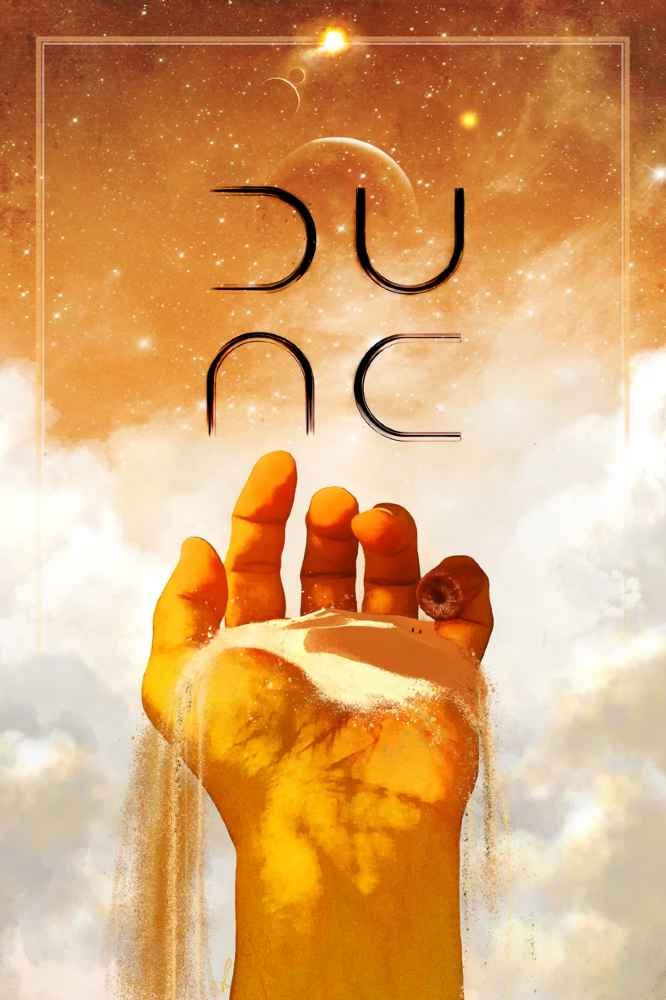
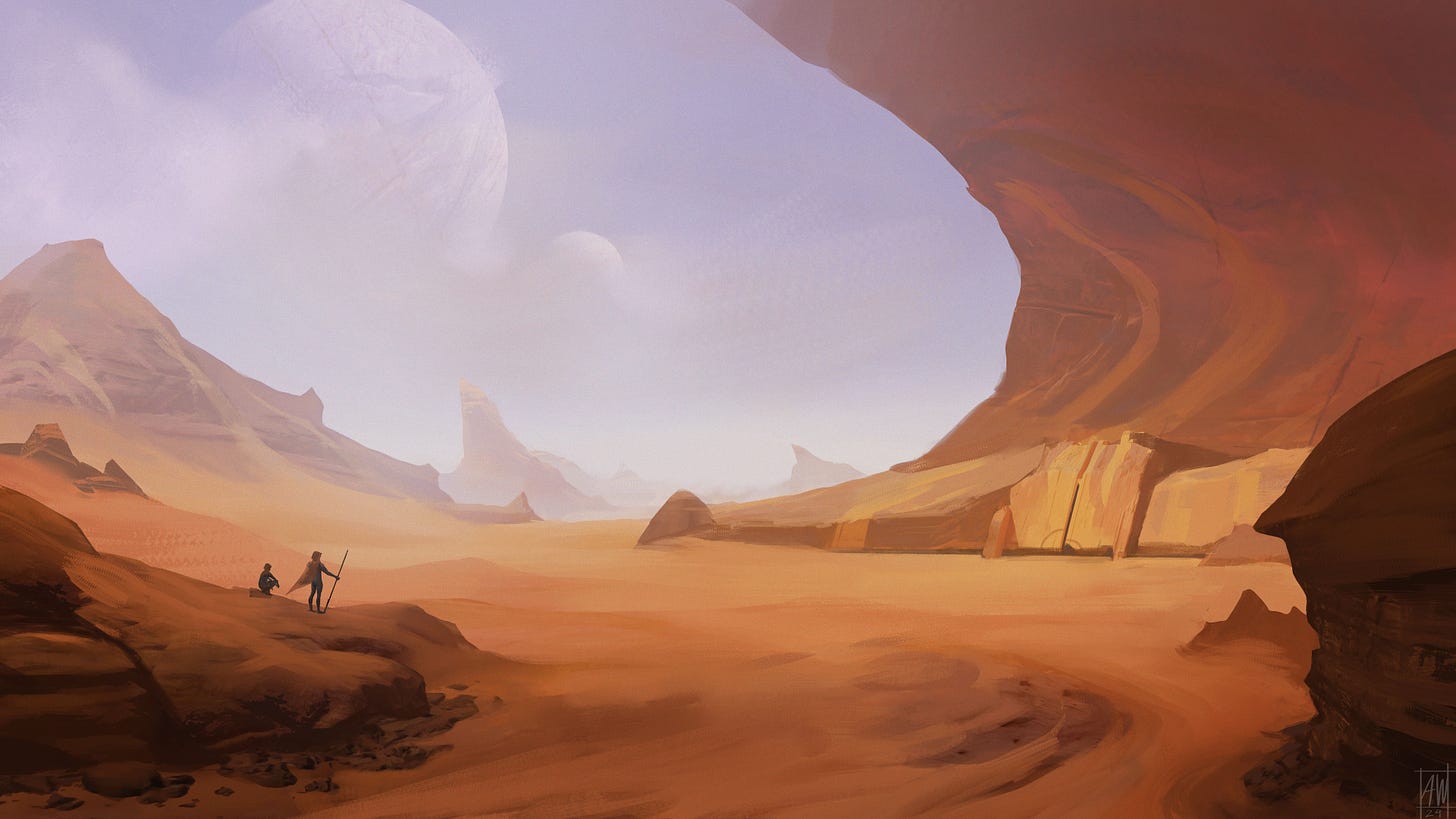
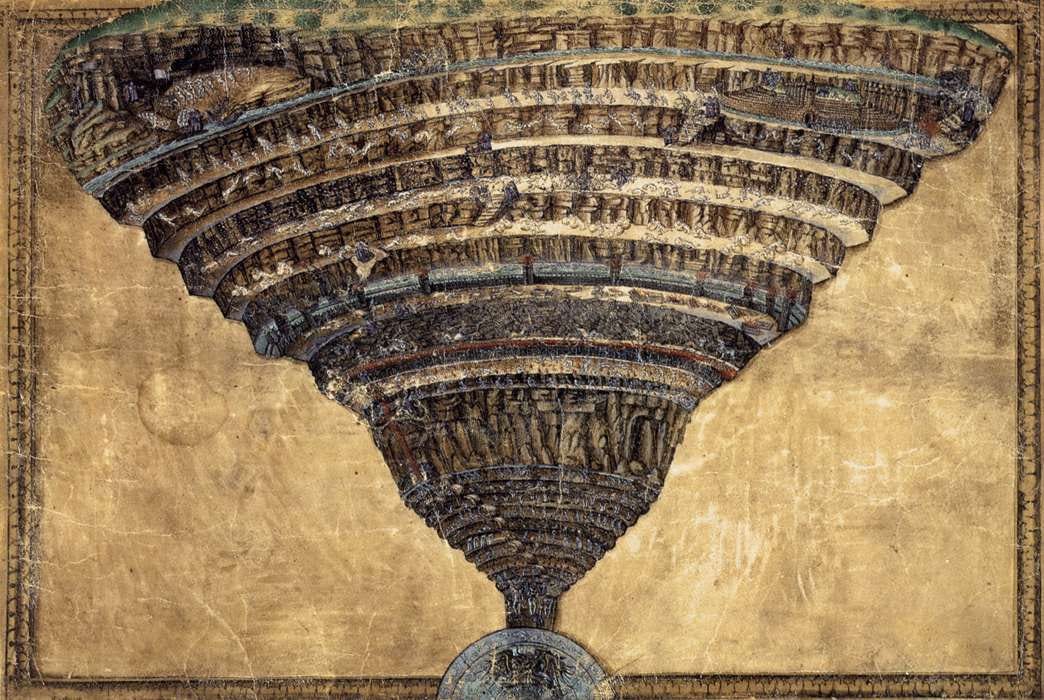

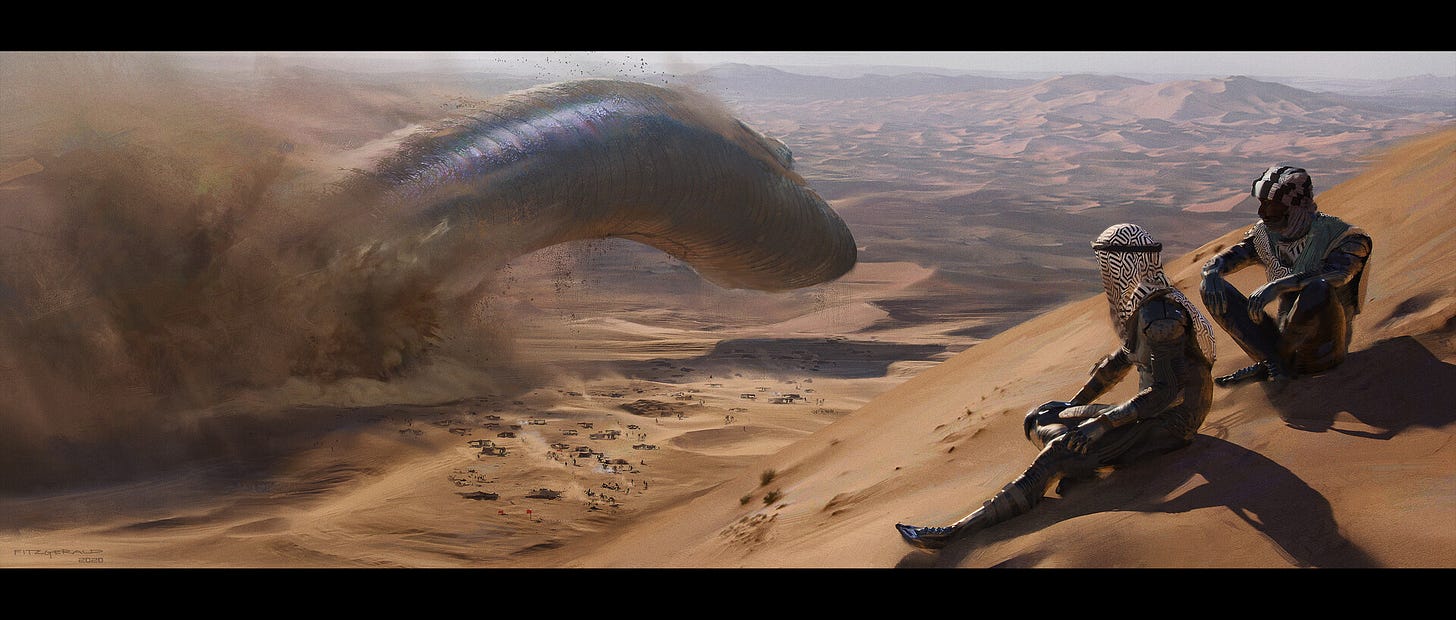
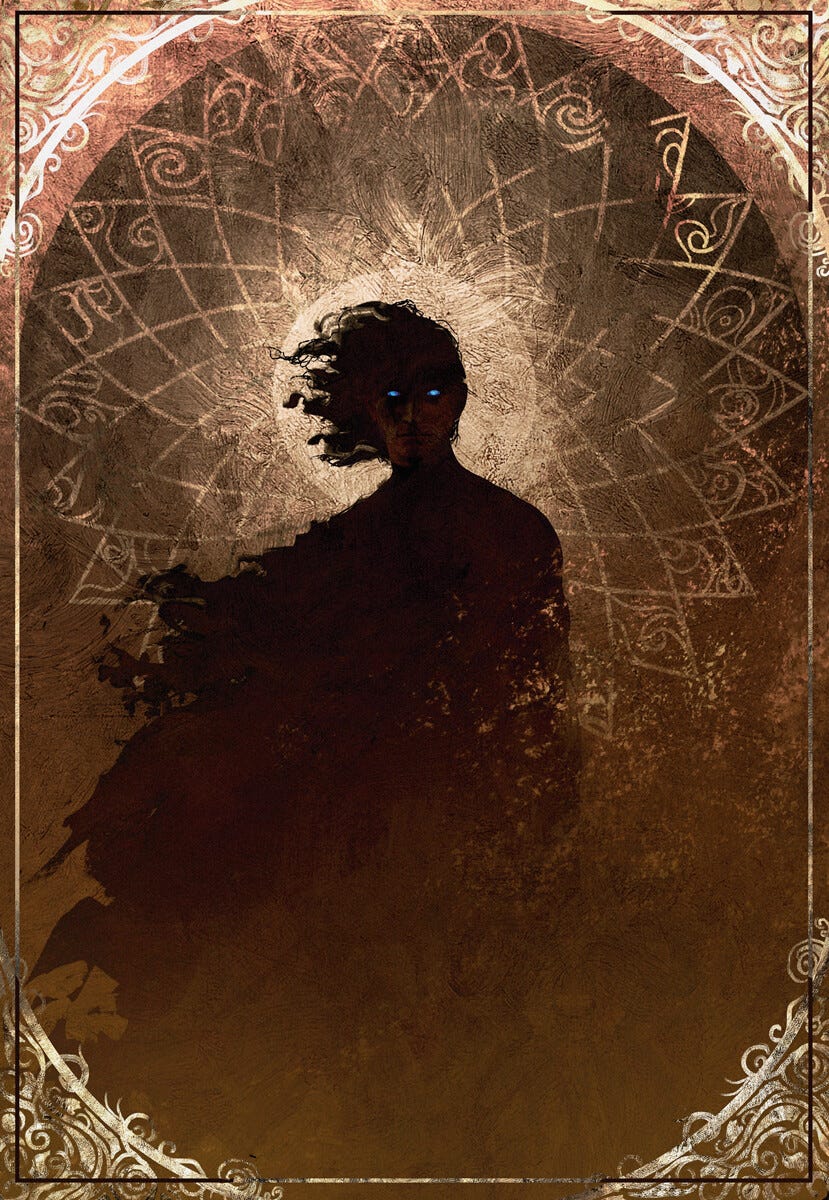
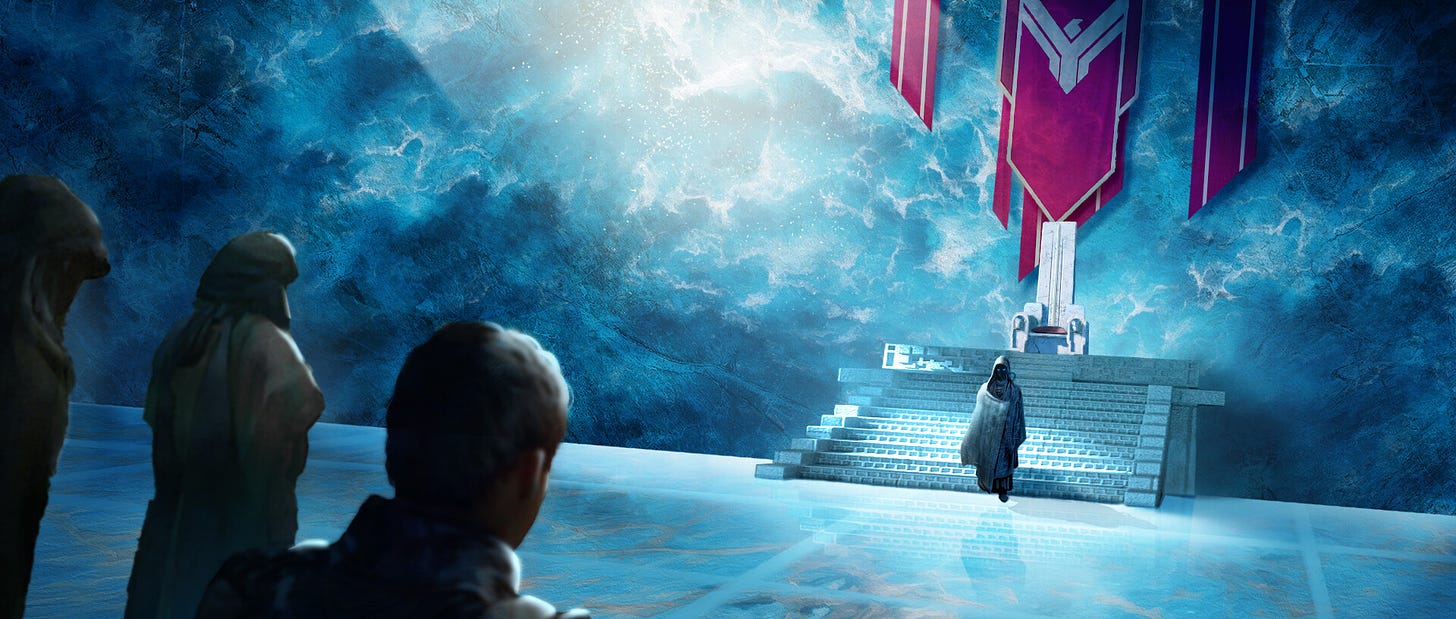
Herbert probably used ‘jihad’ to generate a certain element of exoticism while being clear about the Islamic roots of Fremen culture (hence reference to Zensunni origins). The shift to ‘crusade’ is a bit twee but ‘jihad’ also has very different resonances now than it did in 1965.
A friend has pointed out that quite a lot of the language and patterns of the Fremen comes from Chechen language and culture, so Herbert seems to have taken from several sources.
Moving to anthropology, the bedouin culture of the Arabian peninsula has regularly been wracked by religious strife. This pattern pre-dates Islam but continues after it. Muhammad’s Prophetic claims were bitterly contested in his lifetime. But claims of religious legitimacy continued to be bitterly, even violently, contested down to the present day (e.g. the Houthis). See, for instance, the career of Muḥammad ibn ʿAbd al-Wahhāb ibn Sulaymān al-Tamīmī (1703–1792).
Herbert argued (one suspects correctly: “woke” is very religious in its patterns) that human religious fervour would continue even in the midst of a highly technological culture. But there is no reason to think it would not be influenced by such. I found Chani’s scepticism much less anthropologically surprising than you do. Especially when you consider whose daughter she is (Liet Kynes, planetary ecologist).
I invite you to read the rest of Frank Herbert's Dune series, unfinished as it may be. Messiah is difficult, Children is easier, while God-emperor is the capstone of the series, where he brings out his most substantial ideas. After that, Heretics and Chapterhouse veer off in strange directions -- clearly he was going somewhere with that, but he didn't live to finish the series, and the alleged Dune 7 outline & notes have never been published.
Relevant to this, Frank Herbert actually handled this attitude of subversion and deconstruction very well within his own work. I'm referring to the Museum Fremen, who we meet in God-emperor (spoiler warning). They are the distant descendants of the Fremen, kept around to preserve the old rites & rituals, living on a terraformed Arrakis which is now mostly verdant. And they come to a shock to the reader, because they are an inversion of all that the Fremen represented -- instead of rugged survivalists, zealots and warriors, they are soft, decadent, cynical LARPers! There are scenes where they put on the sacred rituals for paying tourists, and sell a plastic copy of a crysknife, acts which would've been unthinkable to the original Fremen. It's striking to me how the disenchanted, ironic, modern attitude, and its terrible human costs, are expressed perfectly by the Museum Fremen.
This is another example of Frank Herbert's brilliance: he basically saw this debacle coming, almost with the prescience of Muad'dib.